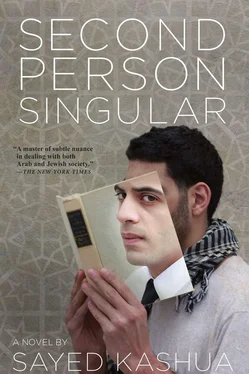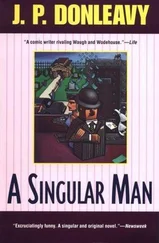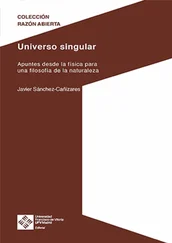“I just hope I’ll be able to pull it off,” she said.
When the doctor asked whether he should issue the death certificate, she’d dissolve in tears and send me to take care of it.
“By then,” she said, when the idea first came up, around a year earlier, “I hope you’ll have decided which ID card to give to the doctors.”
Ruchaleh said that our plan was virtually risk-free. We’ve already taken care of the tricky part, she said once — the identity change. We both preferred the words change and update rather than theft when speaking of Yonatan’s ID.
“It was written from above,” Ruchaleh said once. “You think it’s coincidence that your name is Amir Lahav, a kosher lemahadrin Jewish name?”
My name, written out in Hebrew, really does sound totally Jewish, but in Arabic it’s different — Lahab—meaning flames . I remembered from a young age that whenever I went to the doctor’s office in Petach Tikva or to see my mother when she was in the hospital, Jews always got my name wrong. The way they pronounced it always made me laugh and I would tell my mother about their mistake. Later, as a teenager, it no longer bothered me and I was actually happy to have my name Hebraized, a phenomenon that saved me many a sideways glance. When I went to college the fact that my name could be read both ways turned into a real bonus: it’s how I wound up with a good dorm room at Hebrew University, near campus, unlike the Arabs, who, as freshmen, if they didn’t have connections, were housed in the notorious Eleph dorms on the Givat Ram campus. A day before school started, I discovered that my roommate was Jewish, an economics major, a freshman. He couldn’t keep the surprise off his face when I introduced myself and made a point of pronouncing my name properly, in Arabic.
“Where are you from?’ he asked, the way soldiers do.
“Jaljulia,” I said.
“Cool,” he said, and a moment later he went out for a smoke. Ten minutes later an administrator showed up. “There was a little bit of a misunderstanding here,” she said, explaining that university rules require that, barring written consent to the contrary, Jews and Arabs had to live in separate quarters.
“It’s fine with me,” I said.
“I see,” she said, consulting her clipboard. “I’ll be back in a bit.”
My Jewish roommate came back to the room a few minutes later and started packing up his things. “Bro, they got the living situation a little confused at the office,” he said before leaving.
My new roommate was an Arab from I’billin in the Galilee. I’ll never forget the expression on his face and the dance of joy he did when he came into the room. “They told me I was in Eleph. They sent me a letter — Eleph, it said — and here I am up on Mount Scopus,” he exclaimed. “My friends over at Eleph are going to die when they see this. A steam radiator, on campus. Do you know what Eleph looks like? It’s where they throw all the Arabs. Maybe they started letting Christians get rooms on Mount Scopus. Maybe that’s what happened. This is a miracle. I’m telling you, it’s the miracle of the Virgin Mary.” He kissed his cross, and frowned when he found out I was a Muslim, but he did not leave. “What does it matter — Muslim, Christian? At the end of the day it says Arab next to both of our names.”
Before leaving the house that night, Ruchaleh said, “I need one of the ID cards.” I took one out and gave it to her. The other one I put in my wallet. She opened up the little blue book, smiled, and tears started to well in her eyes. “Everything’s going to work out,” she said, and then she hugged me hard. “Go, go,” she said, “get out of here,” and she shut the door behind me.
GOLDSTAR
I want to be like them . That’s the sentence that was bouncing around my head as I followed Noa into the Ha’sira pub. She said “hey” to a few of the people there, exchanged kisses with a few others, introduced me to them. “Guys, this is Yonatan.”
She walked over to the DJ booth. The guy looked familiar. He slipped off his headphones and smiled at her, leaned over his turntables and his mixer, and kissed her on the cheek.
“Come here,” I read her lips as she motioned me over. “Meet Aviad,” she said. “He’s third-year, visual media.”
I shook his hand.
I want to be like them .
Noa asked what I wanted to drink and smiled when I said red wine, suggesting that I go with beer. I agreed. She preferred sitting at the bar, she said, but we took seats at a little wooden table in the corner because all the bar stools were taken. The DJ played some Radiohead and Noa moved her body to the music, saying that at this hour you could still enjoy the music.
“What do you mean?” I asked.
“You’ll see,” she said.
The more the place filled up, the faster the music got. Aviad played some soft Underworld, then switched to Plastic Man and then back to faster tracks from Underworld. Noa was a better drinker than I was, but she always waited for me to catch up. I struggled to keep the pace, which she thought was funny. I could see that off to the side of the bar the tiny dance floor was starting to fill up, people moving their bodies gently in front of the DJ, not wanting to be the first ones to really dance. I volunteered to buy the third round, and took my place in the crush around the bar. Noa smiled at me each time someone pushed past me. She wanted to get up and come help me but I signaled to her to stay put and save our seats. I was finally able to get two pints of Goldstar and make it back to the table.
I want to be like them . That’s what I thought when Noa said this was the only place she liked to go out in this ghost town of a city. “The nerd-in-disguise hangout,” she said.
Most of the people looked like they were students and I recognized many of the faces from the halls of Bezalel. I’d never been in a place like that, and I liked it. I’d been out to pubs before with Ruchaleh, but they were the kind of places that had soft light and cool jazz, nothing like what was happening here. I had to stop myself from shivering when I thought of Ruchaleh. What was she doing at this moment? How did she feel? I should have been with her. I shouldn’t have left. If everything was going according to plan, then the ambulance should have already left with Yonatan and taken him to the morgue in Shaare Zedek. They don’t check anything there, Ruchaleh had said, it’s just a refrigerated storage room where they keep the merchandise until it’s picked up. Anyone who asked about the funeral would be told that Yonatan, without her even knowing, had decided back in high school to give his body to science.
“What?” Noa asked. I couldn’t hear her.
“Nothing,” I mumbled, and I tried to return to her, to the pub, the music. “L’chaim,” I said, raising my glass, and she raised hers. “L’chaim,” I said again as I brought the glass to my lips and tried to remember that legendary hero from before the days of Islam, a-Zir, who was infamous for his love of women and alcohol. On the night that his father, the head of the tribe, was murdered, they came to the drunk poet and told him the news, to which he said, a pitcher of wine in his hand, “ Ilyom hmar wa’ad amar.” Wine today, action tomorrow. The following day he embarked on one of the most brutal vengeance campaigns in the history of the Arabs.
Beer today, I said to myself and looked around. Today I want to be like them. Today I want to be one of them, to go into the places they’re allowed to go, to laugh the way they laugh, to drink without having to think about God. I want to be like them. Free, loose, full of dreams, able to think about love. Like them. Like those who started to fill the dance floor with the knowledge that it was theirs, they who felt no need to apologize for their existence, no need to hide their identity. Like them. Those who never looked for suspicious glances, whose loyalty was never questioned, whose acceptance was always taken for granted. Today I want to be like them without feeling like I’m committing a crime. I want to drink with them, dance with them, without feeling as though I’m trespassing in a foreign culture. To feel like I belong, without feeling guilty or disloyal. And what exactly was I being disloyal to?
Читать дальше












